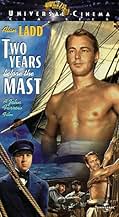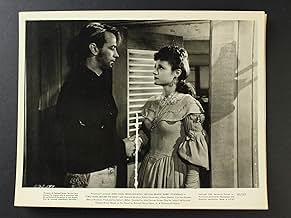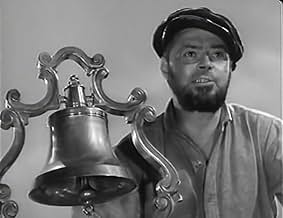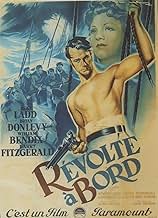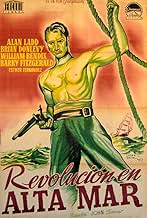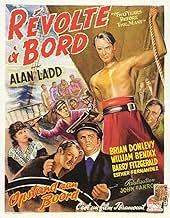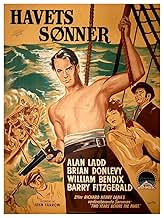The playboy son of a wealthy shipping magnate discovers at first hand the desperate privations suffered by the crew of one of his father's ships after he is unwillingly press-ganged aboard.The playboy son of a wealthy shipping magnate discovers at first hand the desperate privations suffered by the crew of one of his father's ships after he is unwillingly press-ganged aboard.The playboy son of a wealthy shipping magnate discovers at first hand the desperate privations suffered by the crew of one of his father's ships after he is unwillingly press-ganged aboard.
- Director
- Writers
- All cast & crew
- Production, box office & more at IMDbPro
Storyline
Did you know
- TriviaAccording to Howard Da Silva in Alan Ladd's biography, Ladd and William Bendix did not talk to each other although they were friends. Between the scenes everyone went their separate ways.
- Quotes
Captain Francis A. Thompson: Mr. Foster, remove his shirt.
2nd Mate Foster: Aye, aye, sir.
Charles Stewart: Never mind. I'll take it off.
- ConnectionsReferenced in King Leonardo and His Short Subjects: Anchors Awry or Nautical Nut (1961)
- SoundtracksTake Back the Heart
Written by Claribel (Charlotte Arlington Barnard) and Mrs. G.R. Gifford
Featured review
It's been years since I read the book but as I remember it there was no Allan Ladd figure in it, a ne'er do well who is shanghaied aboard the cargo ship Pilgrim. There was just Richard Henry Dana who had dropped out of Harvard because of faulty vision and signed aboard because he thought it might help clear his sight. He didn't go back to college but he left an enduring and compelling account of his trip in the 1840s from Boston to the California coast, and his return aboard the Alert.
The record wasn't only accurate. It was colorful and even lyrical. Herman Melville acknowledged it as an inspiration for Moby Dick. It's an amazingly evocative narrative. Dana Point in southern California is named after him. He and his mates stood atop the cliffs and flung cow hides down to the sailors below, to be loaded aboard the ship.
California at the time was a province of Mexico, and places like San Francisco ("Yerba Buena") and Los Angeles were villages surrounded by large Spanish land grants and ranches. Dana was a humanitarian and, coming from New England, an anti-slavery activist. His purpose was to leave an accurate record of the life of sailors aboard American ships, documenting their characters and their mistreatment.
That's about what I remember from the book. The 1946 movie with Allan Ladd seems to owe a good deal to Jack London's "Sea Wolf", the story of a wealthy young shipwreck survivor picked up by a ship and coerced into working as a members of the crew by a captain who was a madman. This skipper, Howard Da Silva, isn't nuts but insists the men carry out his wishes as if they were the word of God. Maybe Captain Bligh was the inspiration here.
Life on the Pilgram is a rough life. Ladd is assigned the most menial of duties on the deck force while a very young stowaway is appointed cook's helper. In terms of working hours, cooks have one of the roughest jobs of all. They don't strain their muscles, as we had to on the deck force of a Coast Guard cutter, USCGC Gresham, but they have to get up before any of the rest of the crew and start preparing breakfast. And they don't stop working until they've finished cleaning up after the last meal of the day, hours after the day workers have stopped.
The deck force is no picnic either. Everyone on my ship knew the story (possibly "fake news") of the boatswain's mate on a neighboring ship who slapped a seaman across the face and gave him a bloody nose, then made him get on his knees and holystone the blood off the wooden deck. The Chief BM on the Gresham went no farther than raising fist over me and threatening to belt me. Oh, it was rough duty. The blond young Swedish maids helped ease the pain.
Where was I? Yes, no sea duty today compares to what these guys go through -- twenty lashes for looking cross-eye at an officer, and so forth. What's always puzzled me is, if they're going to administer lashes, why do they always rip the shirt down his back? Why not ask him to take it off? Brian Donlevy plays Richard Henry Dana, writing the book in his spare time.
The book, as I say, was a literary gem. Dana captured the experience of working on a sailing ship, including the floggings and the scurvy. (Viz: "Limeys.") Beyond that he gave us treats on landfalls, storms, and ice bergs. Da Silva is the uncompromising and humorless captain. William Bendix is the brutal First Mate Amazeen who gets to belt Ladd on the face. If the producers needed someone to beat hell out of Ladd, more than once it was Bendix. The two men were friends, despite a temporary falling out over Ladd's lack of interest in enlisting during the war.
In Pernambuco, the Pilgrim acquires a passenger -- a beautiful young woman, what else? Compare this to The Sea Wolf, which also picks up a pretty young girl and Jack London's prose turns to mush. Actually, here, Esther Fernández as the requisite romantic role, is quite attractive and gives a respectable performance. Her career flourished in her native Mexico.
I don't think I'll give away the ending except to say there is a violent clash, some deaths, and a victory of sorts. You'll probably enjoy the move. It's aglow with resentment and tension.
The record wasn't only accurate. It was colorful and even lyrical. Herman Melville acknowledged it as an inspiration for Moby Dick. It's an amazingly evocative narrative. Dana Point in southern California is named after him. He and his mates stood atop the cliffs and flung cow hides down to the sailors below, to be loaded aboard the ship.
California at the time was a province of Mexico, and places like San Francisco ("Yerba Buena") and Los Angeles were villages surrounded by large Spanish land grants and ranches. Dana was a humanitarian and, coming from New England, an anti-slavery activist. His purpose was to leave an accurate record of the life of sailors aboard American ships, documenting their characters and their mistreatment.
That's about what I remember from the book. The 1946 movie with Allan Ladd seems to owe a good deal to Jack London's "Sea Wolf", the story of a wealthy young shipwreck survivor picked up by a ship and coerced into working as a members of the crew by a captain who was a madman. This skipper, Howard Da Silva, isn't nuts but insists the men carry out his wishes as if they were the word of God. Maybe Captain Bligh was the inspiration here.
Life on the Pilgram is a rough life. Ladd is assigned the most menial of duties on the deck force while a very young stowaway is appointed cook's helper. In terms of working hours, cooks have one of the roughest jobs of all. They don't strain their muscles, as we had to on the deck force of a Coast Guard cutter, USCGC Gresham, but they have to get up before any of the rest of the crew and start preparing breakfast. And they don't stop working until they've finished cleaning up after the last meal of the day, hours after the day workers have stopped.
The deck force is no picnic either. Everyone on my ship knew the story (possibly "fake news") of the boatswain's mate on a neighboring ship who slapped a seaman across the face and gave him a bloody nose, then made him get on his knees and holystone the blood off the wooden deck. The Chief BM on the Gresham went no farther than raising fist over me and threatening to belt me. Oh, it was rough duty. The blond young Swedish maids helped ease the pain.
Where was I? Yes, no sea duty today compares to what these guys go through -- twenty lashes for looking cross-eye at an officer, and so forth. What's always puzzled me is, if they're going to administer lashes, why do they always rip the shirt down his back? Why not ask him to take it off? Brian Donlevy plays Richard Henry Dana, writing the book in his spare time.
The book, as I say, was a literary gem. Dana captured the experience of working on a sailing ship, including the floggings and the scurvy. (Viz: "Limeys.") Beyond that he gave us treats on landfalls, storms, and ice bergs. Da Silva is the uncompromising and humorless captain. William Bendix is the brutal First Mate Amazeen who gets to belt Ladd on the face. If the producers needed someone to beat hell out of Ladd, more than once it was Bendix. The two men were friends, despite a temporary falling out over Ladd's lack of interest in enlisting during the war.
In Pernambuco, the Pilgrim acquires a passenger -- a beautiful young woman, what else? Compare this to The Sea Wolf, which also picks up a pretty young girl and Jack London's prose turns to mush. Actually, here, Esther Fernández as the requisite romantic role, is quite attractive and gives a respectable performance. Her career flourished in her native Mexico.
I don't think I'll give away the ending except to say there is a violent clash, some deaths, and a victory of sorts. You'll probably enjoy the move. It's aglow with resentment and tension.
- rmax304823
- Jun 16, 2017
- Permalink
- How long is Two Years Before the Mast?Powered by Alexa
Details
- Release date
- Country of origin
- Languages
- Also known as
- Esclavos del mar
- Filming locations
- Production company
- See more company credits at IMDbPro
Box office
- Budget
- $2,000,000 (estimated)
- Runtime1 hour 38 minutes
- Color
- Aspect ratio
- 1.37 : 1
Contribute to this page
Suggest an edit or add missing content

Top Gap
By what name was Two Years Before the Mast (1946) officially released in India in English?
Answer
